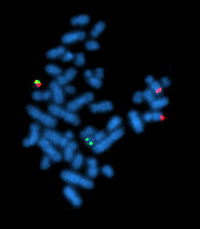
Photo from wikipedia
The resistance to tyrosine kinase inhibitors is currently a major problem for chronic myeloid leukemia (CML) treatment and HSPA8 is highly expressed and a hallmark of poor prognosis in several… Click to show full abstract
The resistance to tyrosine kinase inhibitors is currently a major problem for chronic myeloid leukemia (CML) treatment and HSPA8 is highly expressed and a hallmark of poor prognosis in several human cancers. However, its role in imatinib-resistant CML (IR-CML) cells remains undetermined. Here, we determined HSPA8 was overexpressed in IR-CML cells and associated with imatinib resistance. HSPA8 ablation could downregulate BCR-ABL/STAT5 and BCR-ABL/AKT signaling pathways, dramatically induce proliferation inhibition, autophagy, G0/G1 phase cell cycle arrest but not apoptosis in IR-CML cells. Significantly, HSPA8 ablation enhanced the antitumor activity of imatinib via promoting apoptosis in vitro and vivo.These findings unraveled that HSPA8 ablation inhibits proliferation via downregulating BCR-ABL and enhances chemosensitivity of imatinib in IR-CML cells, which investigate the role and molecular mechanism of HSPA8 in IR-CML cells and suggest that HSPA8 may be a potential target for IR-CML treatment.
Journal Title: Experimental cell research
Year Published: 2021
Link to full text (if available)
Share on Social Media: Sign Up to like & get
recommendations!